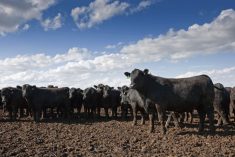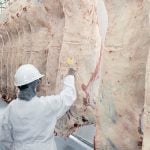The University of Saskatchewan’s veterinary college has stopped all non-emergency treatment of horses at its large-animal clinic while attempting to stem an outbreak of equine herpes near Saskatoon.
The Western College of Veterinary Medicine stopped non-emergency horse work in mid-March after admitting two horses from a local riding stable, both of which were later found to have equine herpes virus, type 1 (EHV-1).
The two horses had recovered enough to be discharged to their home stable by March 26, by which time WCVM field service veterinarians were treating 13 other infected horses on-site at the stable.
Read Also

B.C. ostriches culled, CFIA confirms
Ostriches on an embattled Edgewood, B.C. farm have been culled after a prolonged legal battle, the Canadian Food Inspection Agency has confirmed.
No new clinical cases of EHV-1 have been confirmed at WCVM’s clinic in the past week, nor at the riding stable as of Friday, but the college’s equine admissions are still restricted, the college reported Friday on its EHV-1 blog.
Regular equine clinical services at the WCVM Large Animal Clinic will resume once horses still at the clinic are tested to make sure they pose no risk of virus shedding, and once the hospital facilities have been cleaned and disinfected.
However, the college reported, it’s now testing for possible new cases in four other horses at a second Saskatoon-area farm that may have had contact with infected horses before EHV-1 symptoms appeared. Of the four, one has been euthanized after showing “severe clinical signs” of the disease, while the other three show milder signs.
The farm’s owners have restricted horse traffic on and off their land. The owners of the stable, where all 15 infected animals are now recovering, have quarantined their property.
EHV-1, a relatively common horse virus worldwide, is contagious through contact and through particles dissolved in the air. It can be controlled by restricting contact and with decontamination at affected facilities.
The EHV-1 type can cause respiratory diseases, abortions and neurological disease in affected horses. It doesn’t transmit to humans, nor to other animal species, and is not a reportable disease in Canada, the college noted.
Noting that the outbreak has spurred significant concern from the province’s horse industry, the WCVM and Farm Animal Council of Saskatchewan will host an EHV-1 information seminar April 10 at the Ramada Hotel on Idylwyld Drive in Saskatoon from 7 to 9 p.m.
“This seminar will give people the information they need to minimize the risk of infection on their farms and acreages,” said infectious disease specialist Dr. Hugh Townsend, who will speak at the seminar.













